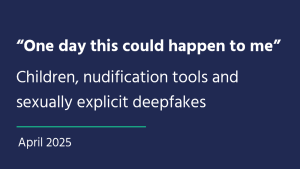As Children’s Commissioner, I advocate for all children in England. However, my role was born out of the acute need to hear the voices of the most at risk children. Child victims of crime are among the most vulnerable – too often excluded from a justice process designed with adults in mind, and overlooked when it comes to specialist support to recover.
It will always be my ultimate ambition to prevent any child from becoming a victim of crime. I recently published my Big Ambition for the children of England, based on the findings of a survey which reached 367,000 children and adults on their behalf. The recommendations are far-reaching in scope – spanning every aspect of a child’s life. Taken in the whole, I think these measures would radically reduce the number of children affected by criminality.
Until this ambition is fully realised, I want to ensure that any child who does tragically experience a crime gets the support and protection they need. This report is based on novel analysis of police transcripts, of police data requested for the first time, but most importantly – on the voices of child victims themselves.
Over the past year, my team and I have worked with ten incredibly brave victims and survivors of sexual harm in childhood, to understand their experiences of the criminal justice system and support services. I am inspired by the resilience of the children and young people who have contributed to this work.
Much of this report makes for very difficult reading – not only the horror of the harms the children have endured, but also the astonishing failures by adults and professionals to identify and respond to this harm in the right way.
Children describe being made to feel as though what they have experienced is not serious, or as though they have brought it upon themselves. When children do report to the police, often the probing evidence-gathering process is extremely traumatic, with children’s age and vulnerability not taken into account. The journey to getting justice can be long, slow and confusing – and sadly often does not lead to the outcome children had hoped for. When a child is not prepared for what this process will involve, it can be all-consuming. Children’s childhoods are put on pause, sometimes for years. While we would expect child victims who have experienced the most serious crimes to receive immediate and long-term support to heal, young people tell us this is often another uphill battle. Sometimes children’s needs are not identified or understood, and sometimes there are simply no appropriate services for them.
This outlook may seem bleak, but there is hope. I am heartened by three things in particular. Firstly, I am reassured by examples of adults and professionals responding to children in a compassionate and child centred way. The teacher who asked her pupil to stay behind at the end of the lesson so she could check in with her, the police officer who took time to build trust with the child he was interviewing. These responses must become the norm. Secondly, I am incredibly impressed by some of the services that do exist for child victims, despite the workforce and funding challenges. The specialist advocate who was able to provide both emotional and practical support to a girl, the holistic ‘one-stop-shop’ service that means child victims can access therapy, health services and the justice system all in one place. These services must be universal. Finally, I am hopeful things can change because of the extraordinarily brave children and young people who share their experiences to make things better for other child victims. The ten children and young people who contributed to this work have pinpointed problems that data shows are systemic. Their experiences must be a catalyst for change.
With the Victims and Prisoners Bill having now completed its passage to become law, we have a real opportunity to radically reset how the system responds to child victims. This must be the beginning of a new chapter, and not seen as a ‘job done’. This report sets out some fundamental reforms which could transform children’s experiences. The starting point must be listening to children, and designing support around their needs. This report could not be clearer that the status quo – of pushing children through systems and services designed for adults, simply cannot go on. Every child victim of crime deserves safety, justice, and to heal.



